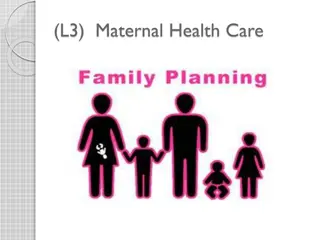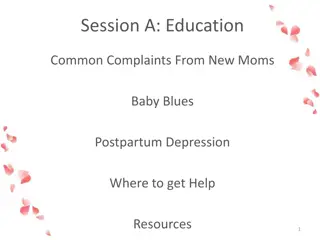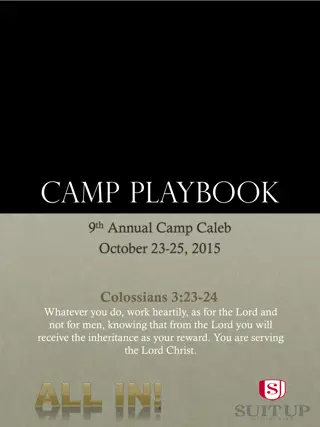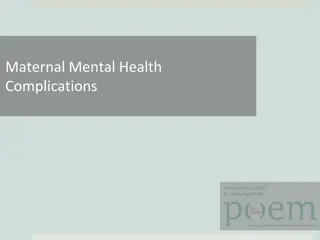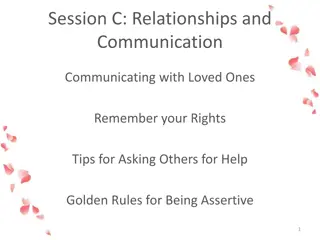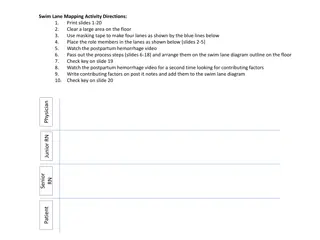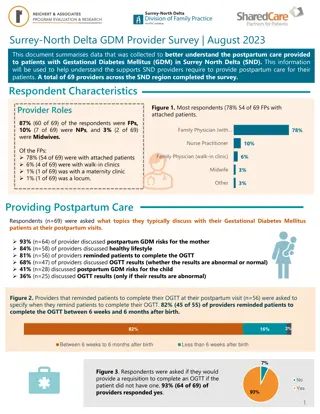Postpartum Support and Education Sessions
Providing a supportive environment for postpartum mothers, these sessions cover topics like setting expectations, motherhood views, baby blues, postpartum depression, seeking support, and importance of assistance. Emphasizing the need for positive support, the sessions aim to equip women with skills to navigate the challenges of motherhood. Date and time for next session are provided along with a preview of stress reduction strategies for the following session.
Download Presentation

Please find below an Image/Link to download the presentation.
The content on the website is provided AS IS for your information and personal use only. It may not be sold, licensed, or shared on other websites without obtaining consent from the author.If you encounter any issues during the download, it is possible that the publisher has removed the file from their server.
You are allowed to download the files provided on this website for personal or commercial use, subject to the condition that they are used lawfully. All files are the property of their respective owners.
The content on the website is provided AS IS for your information and personal use only. It may not be sold, licensed, or shared on other websites without obtaining consent from the author.
E N D
Presentation Transcript
ROSE Flashcards for Educator
Session A Setting Expectations Ground rules Confidentiality, Being supportive to one another, Encouraging participation, time management Description of group Classes (not treatment), skill based, focused on postpartum stress management, session times, cancellations, children at groups Introductions Interventionist, group members
Session A Views on Motherhood Current expectations Society s expectations from media etc., stories heard from woman s own mom, sisters, friends, own story/expectations, different experiences among women Reality of having a baby Hardest job, little training, sleep deprivation etc.
Session A Psychoeducation on Baby Blues Range of responses among women after delivery Most mothers get baby blues up to 80% Description of baby blues (mood swings, crying for no reason) Refer to handouts on Common Complaints and on Baby Blues
Session A Psychoeducation on PPD Ask women if they know the symptoms of postpartum depression or depression, % of women who get it Refer to handout on postpartum depression One in four to five women will experience postpartum depression. Women who have had previous episode/s of depression are more likely to experience depression after childbirth. Those women who have had postpartum depression are more likely to experience it again.
Session A Importance of Seeking Support Can feel better talking to support people Treatment can help Review where to get help handout Review local resources Normalize negative postpartum feelings. Refer to handout you are not alone, you are not to blame, and you can feel better
Wrapup Having a baby is a major life event New demands and new skills will be needed Postpartum women deserve positive support Reemphasize the importance of support (a buffer for PPD) Date and time of next session Preview of next session (ways to decrease stress and support systems)
Session B Welcome and Check-in Progressive Relaxation Exercise Provide rationale Group demonstration (rate anxiety level before and after) Direct women to the online exercise in workbook Assign relaxation exercise for homework (emphasize importance of practice)
Session B Role transitions Positive and negatives changes of becoming a mother Any change is stressful even joyful events Ask for examples when women have had a change in roles and how they survived. Talk about changes a baby will bring Explore possible losses Explore possible benefits/opportunities Explore associated feelings Handout on Gains and Losses
Session B Nurturing The New Mother Importance of taking care of yourself Share handout on Mother the new Mother Use analogy of pitcher Importance of pleasant activities Buffer against depression (lifts mood), energizes, etc. Ask group for examples of pleasant activities once baby is here Refer to handout on pleasant activities Review handout on mother s survival kit
Session B Developing Supports Importance of strong support Ask group to identify supportive people in their lives once baby is here Who will they can turn to, what type of support will they need. Remind women they have a right to reach out, to seek help and support. It is important to look for support from those who are receptive and caring, whoever they may be. Remind women to also include agencies, organizations, providers, place of worship as their supports Continuously probe for possible sources of support. Many women have people who have been supportive of them, but do not label them as support, or are scared or unsure how to ask for the support Ask women to complete the close people handout
Session B Homework Remind group of progressive relaxation exercises and to rate anxiety before and after Refer to handout on daily pleasant activities Commit to at least three pleasant activities in this week If time, ask women to provide their activity, date, and time Wrap up Time of session next week, highlights from next session (i.e., relationship communication, improving communication, how to ask for help, and abusive relationship)
Session C Reviewing Homework Welcome and Check-in Reviewing Homework Ask how it went, how did they feel afterwards, trouble shoot difficulties Emphasize the importance of continuing the contract every week-view as appointments Encourage women to keep doing pleasant activities and relaxation exercises weekly Refer to handouts in workbook
Session C Relationships Psychoeducation on Relationships Your needs and priorities change but others unaware of the shift Having a baby places greater and/or different relationship pressures. Often difficult to get the support you deserve Evaluating an important adult relationship How satisfying is the relationship? Is it supportive overall? What changes would you like to see? Does it feel like a safe relationship to talk over concerns or problems? How are problems dealt with inside of this relationship? Are conflicts expressed?
Session C Interpersonal disputes Types of arguments that tend to take place within a relationship (1) Give and take : people are openly aware of differences, and are actively trying, even if unsuccessfully (talking but not fixing), to bring about changes. (2) Silently resentful: discussion has stopped, and resentment may continue to bubble. (3) Cannot be fixed: the relationship cannot be repaired, both parties are going there own way emotionally
Session C Communication Ask women to think about an important relationship What are your difficulties, your concerns? What are your needs at this time? What are your goals for the relationship? Ask women to complete handout on Communicating with Loved Ones
Session C Assertiveness Psychoeducation on Assertiveness What you could do before may change once your baby is here (provide examples, e.g., could say yes to babysitting for family, doing others laundry, etc.) Explain bucket principle allowing irritations to build until spill over Ask How easy is it for you to ask for things? How well can you say no -Does it differ with different people? What is assertiveness?
Session C Assertiveness Definition of Assertiveness Assertiveness is the ability to express your thoughts and feelings openly and directly to others, without turning them off. You have to recognize others have rights, as well as yourself. Rights Ask what rights do they have in a relationship Refer to Handout on Rights
Session C An Assertive Request Being assertive is a skill you can learn. It may be difficult at first To get the support you need, you will need to make an assertive request (ask for help, ask someone to change a behavior) Remind women once they have their baby it will be important to ask for help and get help Ask women to complete Handout on Communicating with Loved Ones
Session C Role play Role play ineffective communication and ask group for feedback Review handouts on Tips for Asking for Help, Do s and Don ts referring to the ineffective role play
Session C Role play Ask women to think about the goals they set for person in communicating with loved ones handout. Complete handout on Making an assertive request with that person (encourage women to start with low level conflict) Review how women will present their requests Role play a woman s current difficulty based on handout. Ask group for feedback
Session C Abusive Relationship Do not be assertive when: Situation and/or feelings are getting out of control. You could say quickly, for instance, This isn t working out they way I had hoped. Let s talk another time when things are calmer. Person is aggressive. Safety is more important than solving a problem immediately. Remember your rights. Remind women: Domestic violence resources They are not responsible, cannot always avoid or control abuse. They can sometimes reduce their risk and increase their safety. Handouts optional
Session C Homework Refer to handout on Homework on Making an Assertive Request Reminder to practice pleasant activities and relaxation Wrap up Highlights of next session (trouble shoot any problems you had asking for help, negative communication, how to say no to a request, and how to plan for your future)
Session D Review Review Homework Reinforce success Brainstorm any difficulties Normalize --- being assertive is difficult and it is natural to make mistakes Review Assertiveness What is assertiveness The need for support postpartum What do you remember from last session that was most helpful to you
Session D Nonassertive Behavior What does being nonassertive mean? You do not express your own wants, needs, or ideas. You ignore your own rights. Why can people find it difficult to express themselves? fear, guilt, need to be liked, do not know other ways, avoid conflicts What happens when you are nonassertive? Anger, resentment, feel out of control, powerlessness, problems remain
Session D Aggressive Behavior What happens when someone is aggressive? they express their feelings and needs at the expense of others. They violate the rights of others. Why do people act aggressively? Frustrated, lots of stress, nonassertive until they blow What happens when you are aggressive? Overtime destroy a relationship, problem is not fixed in the long run or in the way you would like.
Session D Barriers to Assertiveness Remind group---Assertiveness is best strategy to keep your self-respect and to attempt to solve any problems in your relationships Ask what might stop them from being assertive and asking for help Not valued in women, fear of retaliation and conflict, lack of knowledge of assertiveness as a skill, fear of being called mean or selfish, fear of losing the relationship, forget one s rights, want to be seen as able to do it all Refer to handouts on asking for help Remind group that to overcome these stumbling blocks best to prepare and practice
Session D Saying No Importance of saying no Double load when baby is here, cannot do it all. Need to say no to keep a balance in your life. Have the right to say no Review broken record method Review when to delay an immediate response (unsure, not confident, etc.) Provide example. Provide example of a partial no (i.e., say no to babysitting tomorrow but offer next week) Ask for examples of times when women would have liked to say no but didn t and problem-solve how to say no in the future, including role-plays of situations
Session D Planning for the Future Importance of future dreams Refer to handout infancy does not last forever, hold onto your dreams Importance of taking baby steps makes you feel productive and confident (use example of house to clean overwhelming but closet by closet more manageable) Refer to Handout on planning for future Ask the group, What steps do you need to take towards working towards your dream/goal? How will you accomplish this? When? Work through an example with each group member, and encourage group to brainstorm ideas for one another
Wrap up Assign Goal Setting Homework Review handout ROSE Final Tips If time, complete Handout on My Resources Remind that once they will want to come and see them and their baby-to see how they are doing
Review Session After baby is born Review notes from prior sessions Reintroduce yourself Inquire about birth, baby, etc. Review symptoms of depression Inquire about baby blues and postpartum depression (use handouts from session A) Normalize wherever possible Review resources Support lines, support groups, treatment centers, if needed
Review Session Interpersonal Difficulties Inquire about interpersonal difficulties that were raised from prior sessions Inquire about postpartum difficulties with key people in her life (her partner, extended family or friends) Inquire about postpartum adjustment to and any sadness about past or recent losses of close relatives or friends
Review Session Discuss difficulties and how might relate to her mood If more than one issue ask which one she would like to discuss. If no difficulties, reviews ROSE highlights Role adjustment-check woman had realistic expectations, remind her of mother s survival kit, pleasant activities, relaxation exercises
Review ROSE Highlights Role adjustment Check woman had realistic expectations, remind her of mother s survival kit, pleasant activities, relaxation exercises Normalize where appropriate (e.g., cannot be supermom or be perfect Interpersonal Disputes Ask if any ongoing disagreements or tensions? How are you and the other person talking about the issue? Are you reluctant to approach each other? What do you want from the person? Is this realistic? Normalize if appropriate (e.g., difficulties at this time are not uncommon) Ask ways in which she could handle the disagreement. Refer to assertiveness and rights handouts. Role-play where possible If relationship abuse, review local resources and other abuse handouts
Review ROSE Highlights Interpersonal Isolation Check on degree of support Review potential or old supports Role play how to communicate needs Normalize---many women/new moms have difficulty asking for what they need Difficulties with Bonding Normalize that it not uncommon, not always love at first sight, usually resolves More likely if baby is colicky, importance of rest Can also be a sign of depression. Usually other symptoms present Discuss resources




